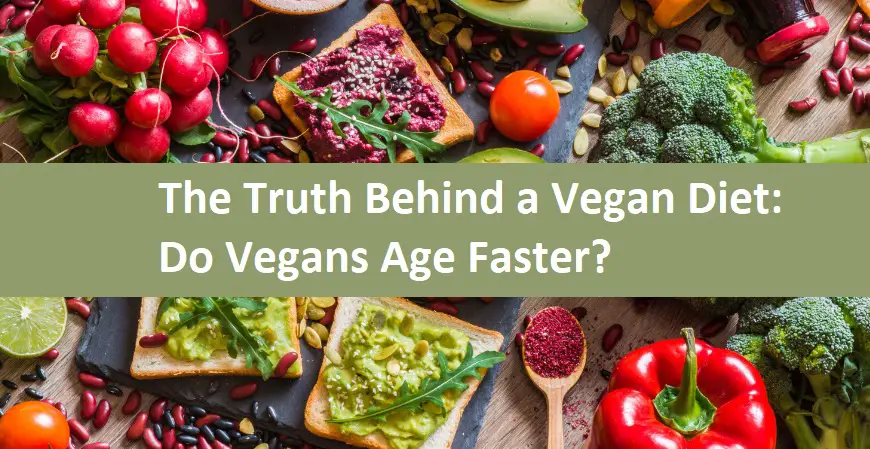Have you ever wondered if a vegan diet can make you age faster? Many people believe that since vegetarians do not consume animal products like meat and dairy, they must be aging more rapidly than those who follow an omnivorous diet. But is there any truth to the notion that vegans age faster? In this article, we’ll explore the facts behind this hotly debated topic.
About Vegan Diet
A vegan diet eliminates all animal products, including any foods derived from animals like dairy and eggs. This means that vegans typically consume a plant-based diet consisting of fruits, vegetables, grains, legumes, nuts, and seeds. Some may also include small amounts of processed vegan products such as plant-based milk and cheeses. Vegans also tend to avoid animal-based clothing and products.
How Vegan Diet Affects Your Aging Process
One of the main benefits of a vegan diet is its high content of antioxidants and phytonutrients, which can help to protect cells from damage caused by free radicals. This protective effect may help slow down the aging process since free radicals contribute to wrinkles and other signs of aging.
How Going Vegan Impacts Your Skin Quality
A vegan diet can help protect the body from damage caused by free radicals due to its higher content of antioxidants and other essential nutrients. These protective compounds have anti-inflammatory properties that can help reduce the appearance of wrinkles, fine lines, and other signs of aging. Additionally, a plant-based diet is rich in vitamins, minerals, and fiber, which can help improve skin elasticity and prevent dryness.
Vegan Diet and Your Lifespan
Studies have found that vegans may live longer than those who follow an omnivorous diet. This is thought to be due to the anti-inflammatory and antioxidant benefits of a vegan diet, which can help protect the body from damage caused by free radicals. Additionally, vegans tend to consume less saturated fat, cholesterol, and sodium than their omnivorous counterparts, which can help reduce the risk of cardiovascular disease and diabetes.
Health Risks of Being Vegan
Despite the potential health benefits of a vegan diet, there are some risks associated with it. Vegans may be at risk for developing certain deficiencies if they don’t consume enough nutrients from plant-based sources. Additionally, vegans may also miss out on certain essential fatty acids and amino acids that are found in animal products such as eggs and dairy.
Additionally, vegans are at a higher risk of developing a vitamin B12 deficiency since animal products are the primary source of this nutrient. Vitamin B12 helps support essential functions such as nerve health, energy production, and cell formation.
Veganism: Is It Safe Long-Term?
Generally, a vegan diet can be safe and healthy for both short-term and long-term use. However, it is important to ensure that you are meeting your nutritional needs from plant-based sources. To do this, vegans should include a variety of nutrient-dense foods in their diet, such as legumes, nuts, seeds, and whole grains.
Additionally, vegans may need to take vitamin B12 since this essential nutrient is largely in animal products. By following guidelines and making sure to get the essential nutrients, you can reap the health benefits of a vegan diet without putting your long-term health at risk.
Does a Vegan Diet Prevent Degenerative Diseases?
While there is evidence to suggest that a vegan diet can help slow the aging process, there is still much to be learned about its effect on degenerative diseases such as Alzheimer’s. To date, studies have not been able to conclusively prove or disprove a link between veganism and the development of these conditions.
However, studies have found that a vegan diet can reduce inflammation, which can help protect against various diseases. Additionally, vegans tend to consume more antioxidants and phytonutrients than those who follow an omnivorous diet, which may also help reduce the risk of certain conditions. Ultimately, more research is needed to determine the full effects of a vegan diet on degenerative diseases.
The Best Age to Go Vegan
The best age to go vegan varies from person to person. Generally, transitioning to a vegan diet is not recommended for children under the age of two as they may be missing out on essential nutrients found in animal products such as eggs and dairy. However, older kids and adults can easily transition to a vegan diet by making sure that their nutritional needs are met through plant-based sources.
It is important for anyone considering a vegan diet to consult with their primary care physician or a registered dietitian before making any changes to their eating. This will help ensure that you are getting all the essential nutrients needed for optimal health. Additionally, it can also help prevent any potential deficiencies from occurring over time.
Conclusion
Overall, veganism can be an effective and beneficial way of eating for both short-term and long-term health. However, it is important to ensure that all nutritional needs are being met to reap the full benefits. With careful planning and guidance from a healthcare professional, individuals of any age can easily transition to a vegan diet and enjoy the many health benefits associated with it.

Morgan Elfman is a compassionate writer, dedicated caregiver, and passionate advocate for senior well-being. Born and raised with a deep sense of empathy and a natural inclination towards service, Morgan has devoted her life to making a positive impact on the lives of seniors.
As a writer for www.choiceseniorlife.com, Morgan utilizes his skills to create insightful and informative content that addresses the unique needs and challenges faced by seniors and their families. Her articles not only provide valuable information on health, lifestyle, and care options but also strive to inspire and empower seniors to lead fulfilling lives.
